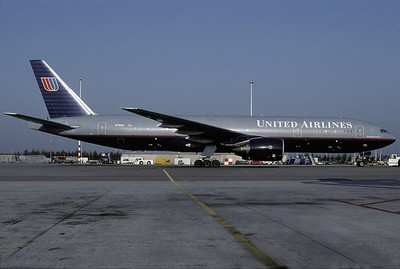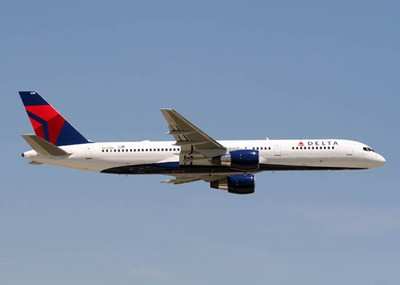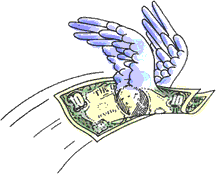Investors Point At Rising Oil Prices
 Airlines are rumored to be talking
about mergers, but while the music is playing no one has taken a
step forward to the dance floor yet. A hedge fund with large stakes
in United Airlines parent UAL Corp. and Delta Air Lines Inc., who
has a healthy interest in spurring a deal between the two, went
public this week with its plan for combining the nation's No. 2 and
No. 3 carriers, stating that rising oil prices and competition
necessitate combining the two, according to the Chicago
Tribune.
Airlines are rumored to be talking
about mergers, but while the music is playing no one has taken a
step forward to the dance floor yet. A hedge fund with large stakes
in United Airlines parent UAL Corp. and Delta Air Lines Inc., who
has a healthy interest in spurring a deal between the two, went
public this week with its plan for combining the nation's No. 2 and
No. 3 carriers, stating that rising oil prices and competition
necessitate combining the two, according to the Chicago
Tribune.
"It's a matter of getting the chaperon out there, getting it
started," said a person close to the hedge fund, Pardus Capital
Management LP.
Apparently backroom talks with the carriers' management teams
dead-ended. Pardus decided to publicize its concerns about the
industry's long-term viability and its case for a merger in a
letter to Delta's top three officials. It sent a similar directive
to United executives, the Tribune reported.
"Pardus is trying to kick them in the butt, to say, 'Let's get
going. Let's not wait for oil to get any higher," said Gordon
Bethune, the blunt former Continental chief executive who has been
consulting with the funds' principals for nearly a month. Merger
rumors have wafted around the industry for a year.

Most airline CEOs, during their most recent earnings calls,
agreed that consolidation was needed. However, many analysts and
observers remain skeptical of any mergers materializing from the
latest industry events. United and Delta were quick to declare that
while they are open to mergers, they are not negotiating. The
reasons are many, mergers would give unions an opportunity to
reopen contracts at a time when workers are dissatisfied with
management and want wage increases, thus diminishing any savings
from a business marriage.
"I think it's a bad time right now," said Roger King, airline
analyst with CreditSights Inc. "It would have to be a consensual
merger, and labor's not going to consent." Also the complexity of
merging two airlines with networks that stretch around the world:
melding disparate computer system, fleets, management teams and
global marketing alliances are corporate challenges difficult to
attain.
"You can sell any deal from a power point," said airline
consultant Robert Mann, president of R.W. Mann & Co. "It's
rather more difficult to make it work in practice." Analysts are
pointing at the need for a restructuring of the airline industry if
oil prices remain high. Every dollar increase in oil costs major
airlines as much as $335 million annually, according to
AirlineForecasts, a Virginia-based market research firm.
"Pardus is trying to bring some awareness of the growing
dissatisfaction with shareholders in the status quo," Bethune told
the Tribune on Wednesday.
"The status quo is no longer sustainable: Why not this and why
not now?" Bethune, who advised Delta's creditor committee on US
Airways' hostile overture earlier this year, indicated he had no
part in merger talks, and had no interest in leading a company if a
merger occurred.

"I'm not going to run anything anytime soon," he said. Bethune
agrees with an analysis, commissioned by Pardus, which found United
and Delta, if combined, would generate $585 million after taxes in
combined earnings. Nearly $169 million would come from revenue
generated by the global network that the deal would create, say
experts familiar with Pardus' analysis. Additional revenue could be
gained by more efficient hub use, and switching to larger
narrow-body jets.
 A scenario sketched out by Pardus
wouldn't involve major job cuts or closing any hubs, according to
Tribune sources. Investors are skeptical about mergers that involve
labor cuts, which could sour a deal.
A scenario sketched out by Pardus
wouldn't involve major job cuts or closing any hubs, according to
Tribune sources. Investors are skeptical about mergers that involve
labor cuts, which could sour a deal.
"Unless you did a substantial capacity cut, there's really no
reason to do this deal," Mann said.
"The economics can't work. And when economics don't work, the
first that happens is cuts." Pardus also envisions a stake by
employees, and estimates a figure of five percent that would be
worth $1.2 billion by 2012. There is no certainty that labor unions
would buy it and that United's pilots won't approve deals
negotiated by management.
While many obstacles meet the concept of consolidation, only
blunders along the way could derail mergers, say experts.
"You never know," said Bethune. "It certainly should happen
unless the idea is defeated by ineptness."
 ANN's Daily Aero-Term (12.13.25): Light Gun
ANN's Daily Aero-Term (12.13.25): Light Gun Aero-News: Quote of the Day (12.13.25)
Aero-News: Quote of the Day (12.13.25) NTSB Final Report: Gippsland GA-8
NTSB Final Report: Gippsland GA-8 Classic Aero-TV: Historically Unique -- Marlin Horst's Exquisite Fairchild 71
Classic Aero-TV: Historically Unique -- Marlin Horst's Exquisite Fairchild 71 Airborne 12.12.25: Global 8000, Korea Pilot Honors, AV-30 Update
Airborne 12.12.25: Global 8000, Korea Pilot Honors, AV-30 Update






